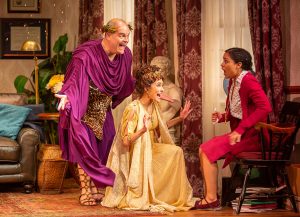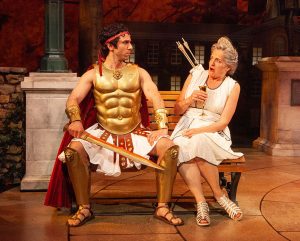Ken Ludwig’s Gods Almighty From Olympus Make Happy Ending at Old Globe
I’m uncomfortable with authors who include their own names in the titles of their plays, as with Ken Ludwig’s The Gods of Comedy, now at the Old Globe Theatre. It smacks of self-importance or worse.
At the theatre these days, however, any declared comedy is at least worthy of considering by audiences so used to wading through dour cynicism and escapist hysteria. And Ludwig (Lend Me a Tenor, Crazy for You) has delivered before.
So the good news is that mirth doth indeed reign in this silly little fantasy-farce with its accomplished cast and bright décor. The lesser news? Well, it could be a better show. Instead of mere amused delight, audiences could find themselves gripped by enthused rapture.
Here’s the premise:
On a field trip to Greece, an appealing young graduate student acquires both the gratitude of her new senior colleague in the classics department and a talisman that provides access to emergency favors from the ancient Greek gods. Back at the university and in desperate need of professional help, her plea to the gods produces two Olympians on assignment from Zeus to provide her (a) an adventure and (b) a happy ending. Failure will bring their eternal banishment to Hades.

Brad Oscar, Jessie Cannizzaro and Shay Vawn, left to right, in Ken Ludwig’s The Gods of Comedy now at the Old Globe Theatre. Jim Cox Photo
The Grecian prologue lends a touch of exotica, the university setting welcomes many sorts of wry academic humor and the quirks of the visiting immortals are a fertile field for gags low and lower, such as back when they encouraged Abraham Lincoln to take a night off and catch the new comedy at Ford’s Theatre. “It was worth a shot…”
But such nuggets are scattered amongst much confusion. The story’s MacGuffin is a script of a lost play by Euripides (c. 480-c. 406 BC). Since only 17 of his estimated 90-plus plays are known to survive, this is a very big deal for classical scholars and for the theatre itself. A worn book is waved about, threatened, lost, duplicated etc. But what is it? Anything from the period would be too fragile to have survived a couple of eons. Is this a hand-written copy? From when? And is it translated? By whom?
While the slapstick gallops ahead, even the casual pedant is slowed or even stumbles, scratching the confused head and mumbling “Wait! Wait!” And that’s just until the whole matter of Olympic politics and genealogy intrudes. As in the theatre sub-committee, Dionysus (aka Bacchus) and Thalia. The former is an A-list son of Zeus whose beat also includes wine, fertility and religious ecstasy; the latter is one of the nine Muses with responsibility for comedy and pastoral poetry and usually is included among the three Graces. Plus, some sources make her the daughter of …Dionysus.
Certainly none of this complicated backstory is disqualifying but all of it could be smoothed into shape by, well, the gods of comedy.

Jessie Cannizzaro, Jevon McFerrin, Steffanie Leigh, Brad Oscar and Shay Vawn, left to right, in Ken Ludwig’s The Gods of Comedy at the Old Globe. Jim Cox Photo
It’s Ludwig himself who evokes, in a program note, the “…the glories of Kaufman and Hart…” Would that these two consummate craftsmen of screwball stage comedy (Once in a Lifetime, You Can’t Take It With You, The Man Who Came to Dinner) could somehow be summoned to help Ludwig tighten and tune. With little more than a few explanatory lines or an easing of the plot twists, this thing might purr.
For example: When even a whiff of magic is introduced, it’s imperative to establish the rules of this particular universe and then follow them scrupulously. Here, the visiting gods are sometimes invisible and sometimes not. Is it easy or hard to make the switch? Is the old gag of a prop seemingly floating in air really worth the potential confusion?
And if the whole play revolves around finding this book, why can’t our jolly visitors just wave a Magic Gesture and produce the thing? Or even another three dozen like it? I’m sure these two characters have wit enough to make some simple explanation funny.
When comedy is the point, characters need to be easily classified and consistent right up until they adjust as needed for the happy end. Here, the dean starts out suggesting a pompous, preoccupied, predatory empire-builder but gradually turns into a yearning idealist. It’s that “gradually” that interrupts the airflow. Most of these characters are stereotypes descended from, well, the Greeks. And it probably would work best if they all were eased into the appropriate stereotypes.
And, while the happy ending is quite satisfactory (and even decorated with some surprises) it’s never in doubt, you know. Just ponder for a moment the chaos in heaven if the gods of comedy really were exiled to burn in hell. Maybe a lesser but still annoying threat?
It’s not that Ludwig and his colleagues lack resources. This really is a script that often sparkles. And some of the sight gags are outstanding, as when a janitor finds what appears to be a discarded book and turns to…audience gasps!…the paper shredder! (Which thereafter glows with sinister menace when mentioned.) Or when a crashing entrance by Ares (aka Mars) comes in the wrong door. Or when a god steps behind a tree and instantly reemerges as one of the other characters. (So often, the old gags are the best ones!)
Shay Vawn is appealing as the grad student but, as the only character with a real chance to metamorphize, she doesn’t do enough with her opportunities. And she’s a lamb among wolves in this company, except with her new professor boyfriend, played with skittish panic by Jevon McFerrin. He uses both innocence and knowing.
Brad Oscar finds his Dionysus somewhere between Zero Mostel and Oliver Hardy with a strong drive toward consumption and a persuasive faith that everything will be fine if we all have another drink. As Thalia, Jessie Cannizzaro slinks with a ladylike raunch and scatters enthusiasm like the confetti she has always at the ready. But the actor who has the most fun probably is George Psomas, who splits time among the Greek tourist hustler, the Russian janitor with dreams and the God of War. Every accent clicks smoothly and the three separate body types are smooth fits.
Stephanie Leigh sizzles as the visiting Hollywood star and Keira Naughton gamely soldiers on with her duties as the Authority Figure, even when she must dress as Artemis and haul around her trademark stag. (Working the crowd at the alumni masquerade party, she meets Ares and, eying the gold-plated muscles, asks: “And what do you do for a living?” He: “Rape and pillage.” She: “Ah, you’re in banking. How wonderful!”)
Amanda Dehnert directs this crowd with a light leash, always alert for the next laugh and blithely ignoring restless realties that threaten confusion.
Jason Sherwood’s set is quite extraordinary in the easy mix of telling interiors with sweeping panoramas and the subtle links of it all. (Hint: Check the color palette.) Linda Roethke has nearly as much fun with the range of costumes as George Psomas does with his mixed bag of characters. And Brian Gale, who makes the shredder into something from a monster film, uses his lighting like a pointer. Jim Steinmeyer earns his billing for the elegance of the special effects but the props in general are superior. Fine job all.
There’s no way a comedy doesn’t deserve its room to strut these days, especially one where whole chunks of Classical Greek are worked in among the yuks.
(Continues on the Old Globe Theatre Shiley Stage at 7 p.m. Tuesdays, Wednesdays and Sundays; at 8 p.m. Thursdays-Saturdays; and at 2 p.m. Saturdays and Sundays through June 16, 2019.)

Welton Jones has been following entertainment and the arts around for years, writing about them. Thirty-five of those years were spent at the UNION-TRIBUNE, the last decade was with SANDIEGO.COM.



